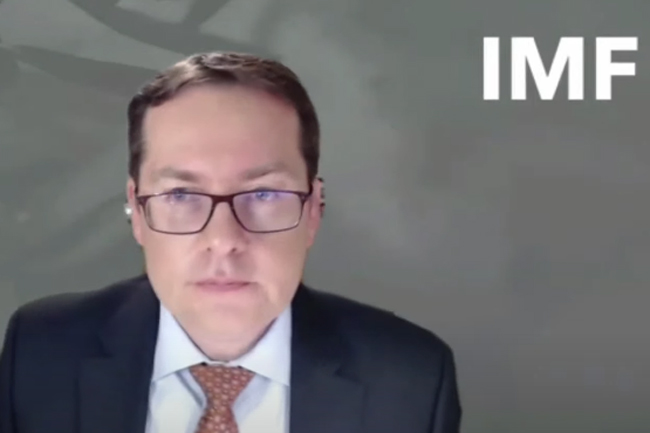Continuing ‘reform momentum’ imperative, increasing SL tax revenues should be growth-friendly: IMF
Efforts to increase tax revenues should be pursued in a ‘growth-friendly’ manner while protecting the poor and vulnerable people, says Peter Breuer, the IMF Asia & Pacific Department’s Senior Mission Chief for Sri Lanka.
His remarks came during a special virtual press briefing held this morning (March 21) on the IMF-supported 48-month extended arrangement under the Extended Fund Facility (EFF) program of SDR 2.286 billion (approximately USD 3 billion) for Sri Lanka.
The executive board of the International Monetary Fund green-lighted this extended arrangement on Monday (March 20). Breuer said the IMF executive board’s approval marks an important step towards the resolution of this crisis.
The EFF program will allow Sri Lanka to access financing of up to USD 7 billion from the IMF, International Financial Institutions (IFIs) and multilateral organizations.
Now that the IMF’s board approval is received, Sri Lanka will immediately receive an initial disbursement of USD 333 million (amounting to SDR 254 million) from the EFF arrangement, which is expected to catalyze new external financing including from the ADB and the World Bank, Breuer said further, assuring that the first tranche of the loan would be released in the next couple of days.
The Senior Mission Chief underscored that the tax reforms implemented under the EFF program are designed to be progressive, meaning that it ensures greater contributions are made by high income earners.
He also emphasized that the economic impact of the reforms on the poor and vulnerable needs to be mitigated with appropriate measures.
Attributing the island nation’s severe crisis to the past policy missteps and economic shocks, Breuer commended the Sri Lankan authorities for implementing challenging policy actions to ride out the crisis situation.
He said it is now essential to continue the ‘reform momentum’ under strong ownership by the authorities and the Sri Lankan people more broadly.
The Senior Mission Chief explained that the reform program supported under the EFF arrangement is built on strong policy measures and prioritizes the following five key pillars:
• An ambitious revenue-based fiscal consolidation, accompanied by stronger social safety nets, fiscal institutional reforms, cost recovery-based energy pricing to ensure the state’s ability to support all its essential expenditures
• Restoration of public debt sustainability including through debt restructuring to ensure stable financing of the government’s operations
• A multi-prompt strategy restore price stability and rebuild reserves under greater exchange rate flexibility in order to alleviate the burden of inflation, particularly on the poor, to foster an environment of investment and growth and to assure Sri Lanka’s ability to purchase essential goods from abroad
• Policies to safeguard the financial sector’s stability to ensure that the financial sector can play its key role in supporting economic growth
• Structural reforms to address corruption, and vulnerabilities and enhance growth
Highlighting the importance of anticorruption and governance reforms, Breuer said it is indispensable to ensure that people receive the benefits of the hard-won gains from reforms.
Breuer further stressed that Sri Lanka must present a debt restructuring strategy by the end of April 2023 to reach the IMF targets to achieve debt sustainability.
Meanwhile, IMF’s Mission Chief for Sri Lanka, Masahiro Nozaki, with regard to Sri Lanka’s local government (LG) polls repeatedly postponed due to the economic crisis situation, noted that the IMF does not intervene in the election process. The Fund has never recommended postponing the LG elections in Sri Lanka, he added.
Source – Adaderana.lk

